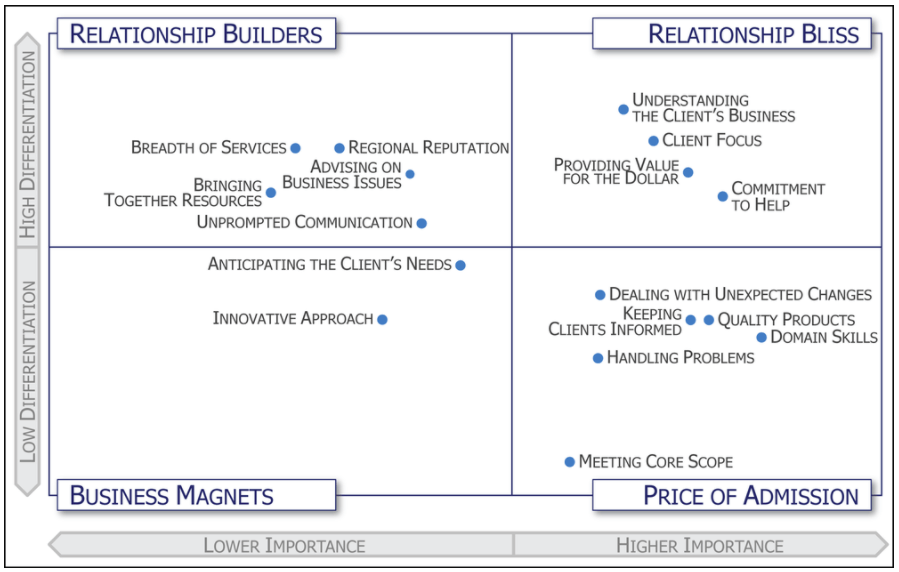As a lawyer, you’re 100 percent committed to helping your clients. But do your clients know this?
Strong client relationships are key for building a successful, client-centered law firm. You might be working late nights and 12-hour days for your clients, but if you’re not consciously building strong lawyer-client relationships, your clients could feel neglected. Remember: While you may have many clients, most of your clients will only have one lawyer. You’ll need to account for that mismatch.
Building strong lawyer-client relationships is key to the success of your law firm. Why? If your clients don’t feel that they’re getting instant, diligent representation, they may not refer future business, and they may even post negative feedback publicly.
Phrases like, “[insert lawyer’s name] didn’t fight for me” litter malpractice grievances and negative Yelp reviews across the web.
Here are a few tips for creating a strong lawyer-client relationship:
1. Be diligent
First and foremost, you have an obligation to be diligent on behalf of your clients. Rule 1.3 in the ABA Model Rules of Professional Conduct states, “[a] lawyer shall act with reasonable diligence and promptness in representing a client.”
A number of items fall under the umbrella of diligence—arriving for appointments on time and managing a reasonable workload, for starters. On top of that, you’ll need to communicate with your clients promptly, whether it’s convenient for you or not.
Beyond your day-to-day commitments, there can be some heavy demands on lawyers in terms of diligence. For example, Comment 1 on Rule 1.3 states, “A lawyer should pursue a matter on behalf of a client despite opposition, obstruction or personal inconvenience to the lawyer.”
What might this look like? For one lawyer, it meant abandoning a $200,000 Ferrari in Toronto floodwaters to make it to his hearing on time.
That’s an extreme example, but lawyers can face personal risk to themselves or their property as a result of being diligent to their clients.
Whether it’s managing your day-to-day commitments or meeting a larger, more timely obligation, having a strong daily routine will help you keep track of your obligations. To help visualize a day in the life of a well-balanced lawyer, we’ve put together a templated schedule for you to build from—and compiled a list of valuable tools to help you stay organized throughout your day.
2. Exercise attention to detail
Lawyers are constantly being asked to do more with less. With new law firm technologies and more apps for lawyers being announced all the time, there are plenty of tools available to help lawyers work smarter.
But, that added efficiency comes at a cost—with more to do, there’s more to juggle. As a lawyer, it’s still your duty to make sure all the tiniest details are correct in every legal document you produce.
Tools like PerfectIt, WordRake, and jEugene can help you take care of details in your written work, while features like document automation in your practice management software can help make sure everything is properly formatted.
3. Keep a reasonable workload
Diligence is important, but in order to be appropriately committed to all of your clients, you’ve got to keep your workload manageable. This might seem like common sense, but it’s also a requirement: Comment 2 on Rule 1.3 states, “[a] lawyer’s workload must be controlled so that each matter can be handled competently.”
In other words, balance isn’t just a matter of self-care for lawyers—it’s a matter of ethics. It’s no use getting more clients if you can’t provide all of them with appropriate representation.
Make sure you’re properly estimating how long tasks will take, and that you’re keeping an eye on your pipeline of new clients. Technology can make this easier. For example, Advanced Tasks, in Clio Manage, available to Elite plan subscribers, let you estimate the amount of time that goes into a task. You can also set statuses for your tasks, assign tasks to different people, and get reports on your firm’s productivity.
4. Take care of yourself
Taking care of yourself might seem out of place on a list of tips for staying committed in lawyer-client relationships, but it’s actually one of the most important things you need to be paying attention to. If you’re not taking care of yourself, you won’t be in a position to help your clients.
In some cases, the need for self-care is mentioned in state bar rules. In the State Bar of California’s Rules of Professional Conduct, Rule 3-110 states that “competence” for lawyers includes the “mental, emotional, and physical ability reasonably necessary for the performance of [legal services].”
As per our cheat sheet, make sure you’re taking at least an hour or two a day for your personal well-being—especially if you’re working long days. Your clients (and your health) will thank you for it.
5. Arrive on time
Comment 3 on Rule 1.3 in the ABA Model Professional Rules of Conduct states, “[p]erhaps no professional shortcoming is more widely resented than procrastination.”
Just meet your deadlines and get there on time. Seems simple, right? For lawyers who have a lot to keep track of, arriving on time might not be as simple as you’d think. Between meetings, appointments, hearings, and deadlines, there are plenty of places for scheduling errors to pop up.
Late meetings and missed dates can be troublesome for the lawyer-client relationship. Even when a client’s interests are not affected in substance, unreasonable delay can cause a client needless anxiety and undermine confidence in the lawyer’s trustworthiness. You can lose the client.
To keep on top of your busy schedule, use calendaring tools to set up reminders. Google Calendars, iCal, or Outlook are great places to start. There are also more advanced tools, like Clio’s Court Rules feature (available for Elite plan subscribers) that helps you calculate key deadlines based on court rules in your jurisdiction.
There’s only so much you can keep in your head. But with the right tools, you’ll get reminders for appointments and key dates right when you need them.
6. Listen
As with any relationship, listening is key when building new relationships with your clients. This doesn’t mean simply asking a token list of client intake questions either—take time to listen to your clients’ problems and make an effort to truly understand what they’re seeking from you.
Only then will you be able to demonstrate a genuine commitment to helping your clients.
Dan Pinnington suggests a good place to start: He asks all of his clients “What’s your greatest concern?” This forces his clients into a moment of clarity, and helps him identify how best to reassure them that he can help with their current situation.
7. Communicate clearly (and often)
How many problems are caused by a lack of clear communication? It’s your duty to promptly and clearly communicate with your clients in a manner that is convenient for them. But in terms of building a strong lawyer-client relationship, communication needs to go beyond the bare minimum.
For example, reaching out to clients unprompted can help them feel that you’re truly focused on their issue.
As Joshua Lenon, Clio’s lawyer in residence, says:
Unprompted communication is something that I think is really easy for lawyers to do, but so few actually do it. Reaching out to a client with an update—whether it’s significant or not—is a great way to show involvement in a matter.
8. Manage expectations
On top of communicating clearly, you’ve got to ensure your client understands exactly what you can do for them. Managing expectations is key for avoiding disappointment down the road.
Don’t make promises you can’t keep, as this can erode your clients’ trust. Just look at this parallel example from the business world: According to the Harvard Business Review, when a company consistently fails to meet lofty expectations, employees lose trust in the organization and start to spend time planning their next move.
In short, it’s better to set realistic expectations and inform your clients about what lies behind them.
Know that success does not guarantee a strong lawyer-client relationship
You may win your clients’ cases, but do you win their hearts? Whether you’re fighting for your clients in court or staying up late doing paperwork, your client needs to understand what you’re doing in order for you to be truly successful.
Remember, to build a strong client relationship, you’ll need to:
- Take time to listen and understand their problems
- Communicate clearly and often
- Arrive on time
- Set realistic expectations about what you can achieve
If you’ve got those down, you’ll be well on your way to creating more client referral opportunities and helping your firm succeed.
We published this blog post in February 2017. Last updated: July 29, 2020.
Categorized in: Business





.png)












